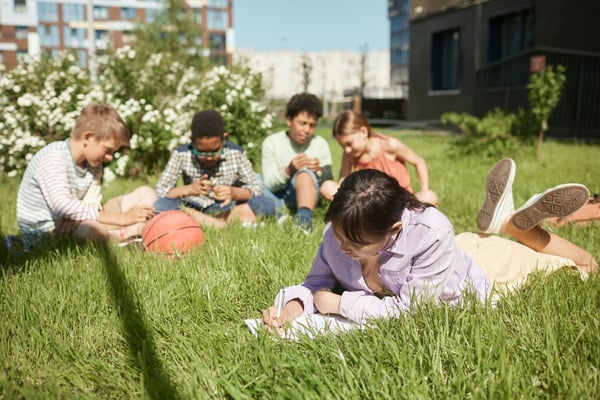
Is summer learning loss real?
At a quick glance, studies on summer learning loss may seem alarming for parents and educators. According to the National Summer Learning Association (NSLA), students who do not participate in educational activities during the summer break can lose two months in math, while low-income students can lose two to three months in reading. By the ninth grade, “summer learning loss during elementary school accounts for two-thirds of the achievement gap in reading between low-income children and their middle-income peers,” the association says.
Looking at a group of studies on learning loss over summer break, a research synthesis conducted by Cooper et al. (1996) combined 39 studies examining the effects of summer vacation on standardized achievement test scores. The combined analysis indicated that summer learning loss “equaled at least one month of instruction as measured by grade level equivalents on standardized test scores-on average, children’s test scores were at least one month lower when they returned to school in fall than scores were when students left in spring.”
In July 2020, however, a more recent summer learning loss study found that more than half of US students experienced summer learning loss five years in a row. “Students in this group lost an average of 39 percent of their total school year gains during each summer. The study appeared in American Educational Research Journal, a peer-reviewed publication of the American Educational Research Association.”
Whether summer learning loss is trivial or severe, there are many other benefits to adding education and fun learning over summer break.
Use it or Lose it
The brain is made up of close to 100 billion very small building blocks called neurons. Whenever you think, feel, or do something, messages travel along existing connections between these neurons, strengthening them with repeated use. This process, known as neural plasticity, helps the brain learn and adapt.
The brain prioritizes efficiency, strengthening neural pathways used frequently and allowing less-used ones to weaken over time. For instance, years after studying calculus, solving problems becomes difficult without continued practice, as the specific brain pathways weaken. Summer is a great opportunity to keep pathways open and expand learning across various domains. Activities that promote reading, writing, math, and critical thinking are valuable, but consider also exploring creativity, problem-solving, and social-emotional skills to nurture your brain's full potential.
Boost Confidence in the Upcoming School Year
Kids and teens who have a routine thrive for several reasons – routines provide a sense of stability and predictability, reduce stress and anxiety, improve time management and organization, encourage self-discipline and independence, and even improve sleep patterns. Incorporating periodic learning activities throughout the summer break establishes a routine during days spent lounging indoors or engaging in outdoor play.
Balance summer fun with engaging learning activities to keep young minds active without sacrificing rest and relaxation.
Low-Pressure Learning to Overcome a Challenge
Summer is more relaxing than the school year and can be a great time to encourage your child or students to spend extra time learning in an area that needs improvement. Take baby steps. Focus on it for short durations, such as 15 minutes a week. No expectations or tests are involved, creating a stress-free environment for learning and growth.
Discover New Interests
Summer learning extends beyond worksheets or traditional reading and writing exercises. It’s an opportunity for children to explore various interests and expand their knowledge in a more active, immersive way. Educational experiences are everywhere, whether visiting the aquarium, traveling to a different state or country, or trying new foods. The summer is an excellent time for children to discover new interests and expand their horizons by actively engaging in the world around them.
Sources:
Summer Learning Loss: The Problem and Some Solutions
Study: More than Half of U.S. Students Experience Summer Learning Losses Five Years in a Row
Neuroplasticity: Learning Physically Changes the Brain
6 reasons why summer learning is important
By Janelle Milanes
Janelle is an educator and writer whose novels have been featured in the New York Times book review and listed as part of Bank Street College's Best Children's Books. Originally from Miami, Florida, she received her BA in English Literature at Davidson College. Her passion for writing led her to New York City to work at Simon & Schuster, where she gained experience in editing and educational marketing. After publishing, Janelle pursued a Master's degree in Special Education and taught in K-12 schools for ten years. She has since hosted writing workshops and mentored hundreds of students to help them achieve postsecondary success. Her experience in education and in narrative writing has equipped her to guide young writers at Write the World through the college essay process and empower them to share their stories in the best light possible.




